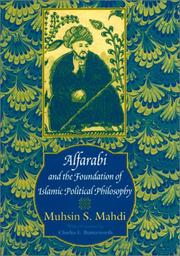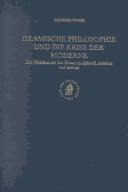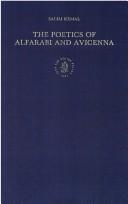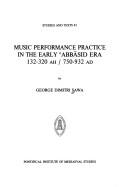| Listing 1 - 9 of 9 |
Sort by
|
Book
ISSN: 05311888 ISBN: 9782711629701 2711629708 Year: 2021 Publisher: Paris Vrin
Abstract | Keywords | Export | Availability | Bookmark
 Loading...
Loading...Choose an application
- Reference Manager
- EndNote
- RefWorks (Direct export to RefWorks)
"La pensée d'al-Fārābī joua un rôle majeur dans le développement de la psychologie philosophique médiévale. Pourtant, les lectures modernes ont souvent cantonné sa doctrine de l'âme aux problèmes eschatologiques et politiques, sans que soit envisagé ce qu'est l'âme ni comment l'homme, de substance matérielle, devient substance intellective. Ce livre s'attache à répondre à ces questions essentielles et à montrer l'originalité et la cohérence de la pensée de Fārābī, qui relie l'épistémologie, la métaphysique, la science naturelle, la logique et la politique. Cette réflexion est tout entière conduite par la volonté de penser le rapport du multiple à l'un, qu'il s'agisse de conjuguer la multiplicité des formes et puissances qui composent l'homme avec l'unité radicale de sa substance, ou de réduire la diversité des sources philosophiques en un système cohérent et unitaire qui s'insère dans le cadre de la pensée du Xe siècle abbasside."--Page 4 of cover
Psychology and Philosophy --- Fārābī, Muḥammad ibn Muḥammad Abū Naṣr al --- -Psychologie et philosophie --- Fārābī, Muḥammad ibn Muḥammad Abū Naṣr al --- -Psychology and Philosophy --- -Psychology and Philosophy - Middle age --- Fārābī, Muḥammad ibn Muḥammad Abū Naṣr al- - 0870?-0950 --- Psychologie et philosophie --- Islamic philosophy --- Soul --- Philosophie islamique. --- Islam --- Fārābī --- -Islamic philosophy --- Fārābī.

ISBN: 0226501868 Year: 2001 Publisher: Chicago (Ill.): University of Chicago press
Abstract | Keywords | Export | Availability | Bookmark
 Loading...
Loading...Choose an application
- Reference Manager
- EndNote
- RefWorks (Direct export to RefWorks)
Islamic philosophy --- Political science --- Philosophie islamique --- Science politique --- Philosophy. --- Philosophie --- Farabi --- Philosophy, Islamic --- -Administration --- Civil government --- Commonwealth, The --- Government --- Political theory --- Political thought --- Politics --- Science, Political --- Social sciences --- State, The --- Arabic philosophy --- Muslim philosophy --- Philosophy, Arab --- Philosophy --- Alpharabius --- Alfarabius --- Abennasar --- Muḥammad ibn Muḥammad al-Fārābī --- Uzluk oğlu Farâbî --- Fārābī, Muḥammad ibn Muḥammad --- Abu Nasr Mukhammad alʹ-Farabi --- Farabi, Abu Nasr Mukhammad --- Abu-Nasr alʹ-Farabi --- Abū Naṣr Fārābī --- Alfarabi --- Alfārābī, Abu Nasr --- Abu Nasr Alfārābī --- Avennasar --- Abu Nasr Forobiĭ --- Форобий, Абу Наср --- Forobiĭ, Abu Nasr --- alʹ-Farabi --- Al-Faraby --- Abu Nasr Muhammet ibn Muhammet ibn Tarhan ibn Uzlug Faraby --- Faraby, Abu Nasr Muhammet ibn Muhammet ibn Tarhan ibn Uzlug --- Abū Naṣr Muḥammad bin Muḥammad bin Ṭarhkhān bin Ūzluġ al-Fārābī --- Fārābī, Abū Naṣr Muḥammad bin Muḥammad bin Ṭarhkhān bin Ūzluġ al --- -Phwarabi, Abu Nassr --- Pharabi --- פאראבי --- أبو نصر الفارابي --- الفارابي --- فارابي --- فرابي --- Islamic philosophy. --- -Philosophy --- -Arabic philosophy --- Administration --- Abū Nasr Muhammed ibn Muhammed ibn Tarhān ibn Uzlag al-Farabi --- Fārābī --- Muhammed Ibn Muhammed (Abu Nasir) al-Farabi --- Fārābī --- Political philosophy --- Fārābī. --- al-Fārābī, Abū-Nasr Muhammad.
Book
ISBN: 0444856579 9780444856579 Year: 1986 Volume: 49,4 Publisher: Amsterdam : North-Holland,
Abstract | Keywords | Export | Availability | Bookmark
 Loading...
Loading...Choose an application
- Reference Manager
- EndNote
- RefWorks (Direct export to RefWorks)
State, The --- Fārābī --- Political and social views --- Farabi --- -Alpharabius --- Alfarabius --- Abennasar --- Muḥammad ibn Muḥammad al-Fārābī --- Uzluk oğlu Farâbî --- Fārābī, Muḥammad ibn Muḥammad --- Abu Nasr Mukhammad alʹ-Farabi --- Farabi, Abu Nasr Mukhammad --- Abu-Nasr alʹ-Farabi --- Abū Naṣr Fārābī --- Alfarabi --- Alfārābī, Abu Nasr --- Abu Nasr Alfārābī --- Avennasar --- Abu Nasr Forobiĭ --- Форобий, Абу Наср --- Forobiĭ, Abu Nasr --- alʹ-Farabi --- Al-Faraby --- Abu Nasr Muhammet ibn Muhammet ibn Tarhan ibn Uzlug Faraby --- Faraby, Abu Nasr Muhammet ibn Muhammet ibn Tarhan ibn Uzlug --- Abū Naṣr Muḥammad bin Muḥammad bin Ṭarhkhān bin Ūzluġ al-Fārābī --- Fārābī, Abū Naṣr Muḥammad bin Muḥammad bin Ṭarhkhān bin Ūzluġ al --- -Phwarabi, Abu Nassr --- Pharabi --- פאראבי --- أبو نصر الفارابي --- الفارابي --- فارابي --- فرابي --- Contributions in political science --- State, The. --- -Contributions in political science --- -Abū Nasr Muhammed ibn Muhammed ibn Tarhān ibn Uzlag al-Farabi --- Alpharabius --- Fārābī --- Muhammed Ibn Muhammed (Abu Nasir) al-Farabi --- Administration --- Commonwealth, The --- Sovereignty --- Political science --- Abū Nasr Muhammed ibn Muhammed ibn Tarhān ibn Uzlag al-Farabi --- Political and social views. --- al-Fārābī, Abū-Nasr Muhammad --- Fārābī - Political and social views

ISSN: 01698729 ISBN: 9004098844 9004451935 9789004098848 9789004451933 Year: 1994 Volume: 20 Publisher: Leiden; Boston : BRILL
Abstract | Keywords | Export | Availability | Bookmark
 Loading...
Loading...Choose an application
- Reference Manager
- EndNote
- RefWorks (Direct export to RefWorks)
Al-Fārābī and Aristotelian Syllogistics deals with an important chapter in the history of Aristotelian logic in early medieval Islam and offers a unique and comprehensive analysis of the writings of the outstanding Muslim philosopher Abū Nasr al-Fārābī (d. 950/51). The first part focuses on a wide range of subjects relating to syllogistic theory proper; the second part deals with its application in the context of Islamic law and theology, and concludes with an in-depth analysis of the way in which Aristotelian logic came to be integrated into Muslim political thought. The sections on syllogistic theory proper are especially important for those interested in the history of Arabic logic; the remaining sections are required reading for historians of Islamic law, theology, and Islamic political philosophy.
Argumentation (Logic) --- Sluitrede --- Syllogism --- Syllogisme --- Philosophy, Arab --- Islamic philosophy --- Logic, Medieval --- Philosophie arabe --- Philosophie islamique --- Logique médiévale --- History --- Greek influences --- Histoire --- Influence grecque --- Farabi --- Aristotle --- Influence. --- Alpharabius --- Alfarabius --- Abennasar --- Muḥammad ibn Muḥammad al-Fārābī --- Uzluk oğlu Farâbî --- Fārābī, Muḥammad ibn Muḥammad --- Abu Nasr Mukhammad alʹ-Farabi --- Farabi, Abu Nasr Mukhammad --- Abu-Nasr alʹ-Farabi --- Abū Naṣr Fārābī --- Alfarabi --- Alfārābī, Abu Nasr --- Abu Nasr Alfārābī --- Avennasar --- Abu Nasr Forobiĭ --- Форобий, Абу Наср --- Forobiĭ, Abu Nasr --- alʹ-Farabi --- Al-Faraby --- Abu Nasr Muhammet ibn Muhammet ibn Tarhan ibn Uzlug Faraby --- Faraby, Abu Nasr Muhammet ibn Muhammet ibn Tarhan ibn Uzlug --- Abū Naṣr Muḥammad bin Muḥammad bin Ṭarhkhān bin Ūzluġ al-Fārābī --- Fārābī, Abū Naṣr Muḥammad bin Muḥammad bin Ṭarhkhān bin Ūzluġ al --- -Phwarabi, Abu Nassr --- Pharabi --- פאראבי --- أبو نصر الفارابي --- الفارابي --- فارابي --- فرابي --- Abū Nasr Muhammed ibn Muhammed ibn Tarhān ibn Uzlag al-Farabi --- Fārābī --- Muhammed Ibn Muhammed (Abu Nasir) al-Farabi --- Logique médiévale --- Fārābī --- Argumentation --- Logic --- Reasoning --- Logic, Symbolic and mathematical --- Arab philosophy --- Arabic philosophy --- Philosophy, Arabic --- Influence --- Fārābī. --- Aristoteles --- Aristote --- Aristotile --- al-Fārābī, Abū-Nasr Muhammad. --- Fåaråabåi. --- Philosophy, Arab - Influence. --- Arisṭāṭṭil --- Aristo, --- Aristotel --- Aristotele --- Aristóteles, --- Aristòtil --- Arisṭū --- Arisṭūṭālīs --- Arisutoteresu --- Arystoteles --- Ya-li-shih-to-te --- Ya-li-ssu-to-te --- Yalishiduode --- Yalisiduode --- Ἀριστοτέλης --- Αριστοτέλης --- Аристотел --- ארסטו --- אריםטו --- אריסטו --- אריסטוטלס --- אריסטוטלוס --- אריסטוטליס --- أرسطاطاليس --- أرسططاليس --- أرسطو --- أرسطوطالس --- أرسطوطاليس --- ابن رشد --- اريسطو --- Pseudo Aristotele --- Pseudo-Aristotle --- アリストテレス

ISBN: 9004120297 9004453180 Year: 2001 Volume: 43 Publisher: Leiden; Boston : BRILL,
Abstract | Keywords | Export | Availability | Bookmark
 Loading...
Loading...Choose an application
- Reference Manager
- EndNote
- RefWorks (Direct export to RefWorks)
This book fills the gap in the research of Leo Strauss (1899 - 1973) showing the influence of Alfarabi (870 - 950), Avicenna (980 - 1037) and Averroes (1126 - 1198) on his thought. The first part is historically-philologically oriented and contains neglected material where it presents a new approach to Leo Strauss's work. The second part discusses Strauss's reaction towards the crisis of modernity, stimulated by Islamic philosophy, as well as his nomic understanding of religion as the essential features of his political philosophy. Since Alfarabi is the Muslim Philosopher who had the greatest influence on Strauss's thought, his philosophy will also be analysed. This book offers the opportunity to discover an interesting aspect of the encounter of cultures, and contribute to a modern reception of Islamic philosophy.
Philosophy, Islamic --- Arabic philosophy --- Muslim philosophy --- Philosophy, Arab --- Averroes --- Avicenna --- Farabi --- Alpharabius --- Alfarabius --- Abennasar --- Muḥammad ibn Muḥammad al-Fārābī --- Uzluk oğlu Farâbî --- Fārābī, Muḥammad ibn Muḥammad --- Abu Nasr Mukhammad alʹ-Farabi --- Farabi, Abu Nasr Mukhammad --- Abu-Nasr alʹ-Farabi --- Abū Naṣr Fārābī --- Alfarabi --- Alfārābī, Abu Nasr --- Abu Nasr Alfārābī --- Avennasar --- Abu Nasr Forobiĭ --- Форобий, Абу Наср --- Forobiĭ, Abu Nasr --- alʹ-Farabi --- Al-Faraby --- Abu Nasr Muhammet ibn Muhammet ibn Tarhan ibn Uzlug Faraby --- Faraby, Abu Nasr Muhammet ibn Muhammet ibn Tarhan ibn Uzlug --- Abū Naṣr Muḥammad bin Muḥammad bin Ṭarhkhān bin Ūzluġ al-Fārābī --- Fārābī, Abū Naṣr Muḥammad bin Muḥammad bin Ṭarhkhān bin Ūzluġ al --- -Phwarabi, Abu Nassr --- Pharabi --- פאראבי --- أبو نصر الفارابي --- الفارابي --- فارابي --- فرابي --- Al-Hosain ben Abdallah ben Sînâ, Abou Alî --- Avicenna Latinus --- Avicenne --- Avicene --- Ibn Sīnā, al-Husayn ibn 'Abd Allāh --- Al-Hoessein Ibn Abdoellah Ibn Sînâ, Abou Alî --- Ibn Rochd --- Ibn Rušd al-Hafīd --- Ibn Rušd, Abū 'l-Walīd --- Muhammed Ibn Ahmad --- Abū Nasr Muhammed ibn Muhammed ibn Tarhān ibn Uzlag al-Farabi --- Fārābī --- Muhammed Ibn Muhammed (Abu Nasir) al-Farabi --- Islamic philosophy --- Averroës, --- Avicenna, --- Fārābī. --- Abū al-Walīd ibn Rushd, --- Abū al-Walīd Muḥammad ibn Aḥmad ibn Rushd, --- Abū el-Walīd ibn Roshd, --- Abuʼl-Walid Muhammad bin Rusjd, --- Alṿalid ibn Rushd, --- Averroè, --- Averróis, --- Bin Rusjd, Muhammad bin Ahmad, --- Ibn-e-Rushd, --- Ibn-i Rushd, --- Ibn Rashad, --- Ibn Rochd, --- Ibn Roshd, Abū el-Walīd, --- Ibn Roshd, --- Ibn Ruschd, --- Ibn Rušd, --- Ibn Rushd, --- Ibn Rushd al-Ḥafīd, --- Ibn Rushd, Abū al-Walīd, --- Ibn Rushd, Abū al-Walīd Muḥammad ibn Aḥmad, --- Ibn Rushd, Abul Walid Muhammad ibn Ahmad, --- Ibnu Rosjid, --- Ibnu Rusjd, --- ابن رشد، --- Muḥammad ibn Aḥmad ibn Rushd, --- al-Fārābī, Abū-Nasr Muhammad. --- Islamic philosophy. --- Modernity. --- Rezeption.

ISSN: 01698729 ISBN: 9004093710 9004451145 9789004093713 9789004451148 Year: 1991 Volume: 9 Publisher: Leiden; Boston : BRILL
Abstract | Keywords | Export | Availability | Bookmark
 Loading...
Loading...Choose an application
- Reference Manager
- EndNote
- RefWorks (Direct export to RefWorks)
This book is an important and original study of medieval Arabic theories of poetics. It examines the commentaries on Aristotle's Poetics by Alfarabi and Avicenna , placing them fully in the context of the Arabic development of Aristotle's logical theory. In this the author breaks new ground, showing how the philosophers justified the logical and moral power of poetics discourse. Its concern for philosophical issues in the Classical Arabic tradition distinguishes this book from other studies of literary theory.
Islamic philosophy --- Philosophie islamique --- Greek influences --- Influence grecque --- Aristotle. --- Avicenna, --- Farabi --- Views on poetics --- et la poésie --- Et la poésie --- Fārābī --- Aristoteles. --- Avicenna --- -Farabi --- -Alpharabius --- Alfarabius --- Abennasar --- Muḥammad ibn Muḥammad al-Fārābī --- Uzluk oğlu Farâbî --- Fārābī, Muḥammad ibn Muḥammad --- Abu Nasr Mukhammad alʹ-Farabi --- Farabi, Abu Nasr Mukhammad --- Abu-Nasr alʹ-Farabi --- Abū Naṣr Fārābī --- Alfarabi --- Alfārābī, Abu Nasr --- Abu Nasr Alfārābī --- Avennasar --- Abu Nasr Forobiĭ --- Форобий, Абу Наср --- Forobiĭ, Abu Nasr --- alʹ-Farabi --- Al-Faraby --- Abu Nasr Muhammet ibn Muhammet ibn Tarhan ibn Uzlug Faraby --- Faraby, Abu Nasr Muhammet ibn Muhammet ibn Tarhan ibn Uzlug --- Abū Naṣr Muḥammad bin Muḥammad bin Ṭarhkhān bin Ūzluġ al-Fārābī --- Fārābī, Abū Naṣr Muḥammad bin Muḥammad bin Ṭarhkhān bin Ūzluġ al --- -Phwarabi, Abu Nassr --- Pharabi --- פאראבי --- أبو نصر الفارابي --- الفارابي --- فارابي --- فرابي --- Al-Hosain ben Abdallah ben Sînâ, Abou Alî --- Avicenna Latinus --- Avicenne --- Avicene --- Ibn Sīnā, al-Husayn ibn 'Abd Allāh --- Al-Hoessein Ibn Abdoellah Ibn Sînâ, Abou Alî --- Aristoteles --- Aristote --- Aristotle --- Aristotile --- -Views on poetics --- -Aristoteles --- Abū Nasr Muhammed ibn Muhammed ibn Tarhān ibn Uzlag al-Farabi --- Alpharabius --- Muhammed Ibn Muhammed (Abu Nasir) al-Farabi --- Fārābī --- et la poésie --- Et la poésie --- Fārābī. --- Ἀριστοτέλης. --- al-Fārābī, Abū-Nasr Muhammad. --- Views on poetics. --- Avicenna, 980-1037 - Views on poetics. --- Farabi - Views on poetics. --- Aristotle. - Poetics --- Avicenna, - 980-1037 --- Commentary --- Literature theory --- Poetics --- Rhetoric
Book
ISBN: 290131516X 2351595009 9782901315162 Year: 1994 Volume: 149 Publisher: Institut Français de Damas,
Abstract | Keywords | Export | Availability | Bookmark
 Loading...
Loading...Choose an application
- Reference Manager
- EndNote
- RefWorks (Direct export to RefWorks)
Islamic philosophy --- Fārābī --- Language --- Qur'an --- Language, style --- Philosophy & Religion --- Philosophy --- Philosophy, Islamic --- -Arabic philosophy --- Muslim philosophy --- Philosophy, Arab --- Terminology --- Farabi --- -Alpharabius --- Alfarabius --- Abennasar --- Muḥammad ibn Muḥammad al-Fārābī --- Uzluk oğlu Farâbî --- Fārābī, Muḥammad ibn Muḥammad --- Abu Nasr Mukhammad alʹ-Farabi --- Farabi, Abu Nasr Mukhammad --- Abu-Nasr alʹ-Farabi --- Abū Naṣr Fārābī --- Alfarabi --- Alfārābī, Abu Nasr --- Abu Nasr Alfārābī --- Avennasar --- Abu Nasr Forobiĭ --- Форобий, Абу Наср --- Forobiĭ, Abu Nasr --- alʹ-Farabi --- Al-Faraby --- Abu Nasr Muhammet ibn Muhammet ibn Tarhan ibn Uzlug Faraby --- Faraby, Abu Nasr Muhammet ibn Muhammet ibn Tarhan ibn Uzlug --- Abū Naṣr Muḥammad bin Muḥammad bin Ṭarhkhān bin Ūzluġ al-Fārābī --- Fārābī, Abū Naṣr Muḥammad bin Muḥammad bin Ṭarhkhān bin Ūzluġ al --- -Phwarabi, Abu Nassr --- Pharabi --- פאראבי --- أبو نصر الفارابي --- الفارابي --- فارابي --- فرابي --- -Terminology --- -Language --- -Abū Nasr Muhammed ibn Muhammed ibn Tarhān ibn Uzlag al-Farabi --- Alpharabius --- Fārābī --- Muhammed Ibn Muhammed (Abu Nasir) al-Farabi --- Arabic philosophy --- Abū Nasr Muhammed ibn Muhammed ibn Tarhān ibn Uzlag al-Farabi --- Language. --- Qurʼan --- Al-Coran --- Al-Qur'an --- Alcorà --- Alcoran --- Alcorano --- Alcoranus --- Alcorão --- Alkoran --- Coran --- Curān --- Gulan jing --- Karan --- Koran --- Koranen --- Korani --- Koranio --- Korano --- Ku-lan ching --- Ḳurʼān --- Kurāna --- Kurani --- Kuru'an --- Qorān --- Quräan --- Qurʼān al-karīm --- Qurʺon --- Xuraan --- Κοράνιο --- Каран --- Коран --- קוראן --- قرآن --- Language, style. --- al-Fārābī, Abū-Nasr Muhammad --- Islamic philosophy - Terminology --- Fārābī - Language
Book
ISBN: 0691078084 1322018375 1400861497 0691604169 9780691078083 Year: 1990 Publisher: Princeton, N.J. Princeton University Press
Abstract | Keywords | Export | Availability | Bookmark
 Loading...
Loading...Choose an application
- Reference Manager
- EndNote
- RefWorks (Direct export to RefWorks)
Widely recognized as one of the most original and profound philosophers that the medieval Islamic world produced, Alfarabi (870-950) wrote many works of political philosophy addressing the issues that dominated Greek political thought as well as new questions raised by the advent of revealed religion. Taking into account Alfarabi's major political treatises, Miriam Galston develops a theory explaining how together they form a coherent philosophy of politics. Her inquiry centers on Alfarabi's discussions of the nature of happiness, the attributes of ideal rulers, the best form of government, and the relationship between political science and theoretical inquiry. Based upon a new interpretation of Alfarabi's method of writing, Galston explores his use of dialectic, which she traces, in part, to his belief that personal discovery is a condition of philosophic understanding and to his desire to create for the reader a dialogue between Plato and Aristotle.Originally published in 1990.The Princeton Legacy Library uses the latest print-on-demand technology to again make available previously out-of-print books from the distinguished backlist of Princeton University Press. These editions preserve the original texts of these important books while presenting them in durable paperback and hardcover editions. The goal of the Princeton Legacy Library is to vastly increase access to the rich scholarly heritage found in the thousands of books published by Princeton University Press since its founding in 1905.
--IXe-Xe s. --- Al-Farabi --- --485 --- Farabi --- -Alpharabius --- Alfarabius --- Abennasar --- Muḥammad ibn Muḥammad al-Fārābī --- Uzluk oğlu Farâbî --- Fārābī, Muḥammad ibn Muḥammad --- Abu Nasr Mukhammad alʹ-Farabi --- Farabi, Abu Nasr Mukhammad --- Abu-Nasr alʹ-Farabi --- Abū Naṣr Fārābī --- Alfarabi --- Alfārābī, Abu Nasr --- Abu Nasr Alfārābī --- Avennasar --- Abu Nasr Forobiĭ --- Форобий, Абу Наср --- Forobiĭ, Abu Nasr --- alʹ-Farabi --- Al-Faraby --- Abu Nasr Muhammet ibn Muhammet ibn Tarhan ibn Uzlug Faraby --- Faraby, Abu Nasr Muhammet ibn Muhammet ibn Tarhan ibn Uzlug --- Abū Naṣr Muḥammad bin Muḥammad bin Ṭarhkhān bin Ūzluġ al-Fārābī --- Fārābī, Abū Naṣr Muḥammad bin Muḥammad bin Ṭarhkhān bin Ūzluġ al --- -Phwarabi, Abu Nassr --- Pharabi --- פאראבי --- أبو نصر الفارابي --- الفارابي --- فارابي --- فرابي --- Politische Philosophie --- Fārābī --- al-Fārābī, Abū Naṣr Muḥammad ibn Muḥammad, --- Fārābī, --- Al-Farabi, Muhammad b. Muhammad --- Farābī, Abū-Naṣr Muḥammad Ibn-Muḥammad al --- -Farābī, Muḥammad ibn Muḥammad Abū Naṣr al-, --- Et la science politique. --- Influencia. --- Contribution à la science politique. --- Politische Philosophie. --- Farābī, Abū-Naṣr Muḥammad Ibn-Muḥammad al-. --- Farābī, Muḥammad ibn Muḥammad Abū Naṣr al-, --- -Abū Nasr Muhammed ibn Muhammed ibn Tarhān ibn Uzlag al-Farabi --- Alpharabius --- Muhammed Ibn Muhammed (Abu Nasir) al-Farabi --- Fārābī --- Abū Nasr Muhammed ibn Muhammed ibn Tarhān ibn Uzlag al-Farabi --- Political and social views. --- al-Fārābī, Abū-Nasr Muhammad --- Islam --- --Philosophie --- --Philosophie politique --- Contributions in political science --- Politics --- Politieke filosofie. --- Philosophy. --- --IXe-Xe s., --- --Farabi --- Farabi, Muhammad ibn Muhammad Abû Nasr al --- -Contributions in political science --- Fÿarÿabÿi - Contributions in political science. --- POLITICAL SCIENCE / General. --- Philosophie --- IXe-Xe s., 801-1000 --- Philosophie politique --- Farabi - Contributions in political science

ISBN: 0888440928 9780888440921 Year: 1989 Volume: 92 Publisher: Toronto Pontifical institute of mediaeval studies
Abstract | Keywords | Export | Availability | Bookmark
 Loading...
Loading...Choose an application
- Reference Manager
- EndNote
- RefWorks (Direct export to RefWorks)
Performance practice (Music) --- Abbasids. --- History --- 78 "07/09" --- Music --- -Music --- -Islamic music --- -Islam and music --- Mosque music --- Music, Islamic --- Muslim music --- Muslims --- Sacred music --- Art music --- Art music, Western --- Classical music --- Musical compositions --- Musical works --- Serious music --- Western art music --- Western music (Western countries) --- Muziek--?"07/09" --- History and criticism --- Interpretation (Phrasing, dynamics, etc.) --- Performance --- -History --- Farabi --- Abu al-Faraj al-Isbahani --- Alpharabius --- Alfarabius --- Abennasar --- Muḥammad ibn Muḥammad al-Fārābī --- Uzluk oğlu Farâbî --- Fārābī, Muḥammad ibn Muḥammad --- Abu Nasr Mukhammad alʹ-Farabi --- Farabi, Abu Nasr Mukhammad --- Abu-Nasr alʹ-Farabi --- Abū Naṣr Fārābī --- Alfarabi --- Alfārābī, Abu Nasr --- Abu Nasr Alfārābī --- Avennasar --- Abu Nasr Forobiĭ --- Форобий, Абу Наср --- Forobiĭ, Abu Nasr --- alʹ-Farabi --- Al-Faraby --- Abu Nasr Muhammet ibn Muhammet ibn Tarhan ibn Uzlug Faraby --- Faraby, Abu Nasr Muhammet ibn Muhammet ibn Tarhan ibn Uzlug --- Abū Naṣr Muḥammad bin Muḥammad bin Ṭarhkhān bin Ūzluġ al-Fārābī --- Fārābī, Abū Naṣr Muḥammad bin Muḥammad bin Ṭarhkhān bin Ūzluġ al --- -Phwarabi, Abu Nassr --- Pharabi --- פאראבי --- أبو نصر الفارابي --- الفارابي --- فارابي --- فرابي --- -Muziek--?"07/09" --- 78 "07/09" Muziek--?"07/09" --- -Sacred music --- Islam and music --- Abū Nasr Muhammed ibn Muhammed ibn Tarhān ibn Uzlag al-Farabi --- Fārābī --- Muhammed Ibn Muhammed (Abu Nasir) al-Farabi --- Abbasids --- Musical performance practice --- Performing practice (Music) --- Caliphs --- Abū al-Faraj al-Iṣbahānī, --- Fārābī. --- Abī al-Faraj al-Aṣbahānī, --- Abū al-Faraj al-Iṣbahānī ʻAlī ibn al-Ḥusain, --- Abū al-Faraj al-Iṣbahānī ʻAlī ibn Ḥusain, --- Abū al-Faraj al-Iṣfahānī, --- Abu-lʻ-Faradzh alʹ-Isfakhani, --- Abu'l Faraj'l Asfahani, --- ʻAlī ibn al-Ḥusain, Abū al-Faraj al-Iṣbahānī, --- ʻAlī ibn al-Huṣayn al-Iṣbahānī, --- Alī ibn Ḥusain, Abū al-Faraj al-Iṣbahānī, --- Asfahani, Abuʼl Farajʼl, --- Iṣbahānī, Abū al-Faraj, --- Iṣfahānī, Abū al-Faraj, --- Isfaḣani, Ăbu̇lfărăj, --- Isfakhani, Abu-lʹ-Faradzh, --- أبو الفرج الأصبهاني، --- أبو الفرج الإصبهاني، --- أبو الفرج الإصفهاني، --- أبو الفرج الاصبهانى --- أبو الفرج الاصفهاني --- أصبهاني، أبو الفرج --- ابو الفرج الإصفعاني --- ابو الفرج الاصبهاني، --- ابو الفرج الاصبهني، --- ابو فرج الاصبهاني --- al-Fārābī, Abū-Nasr Muhammad. --- Performance practice (Music) - Middle East - History - To 1500.
| Listing 1 - 9 of 9 |
Sort by
|

 Search
Search Feedback
Feedback About
About Help
Help News
News